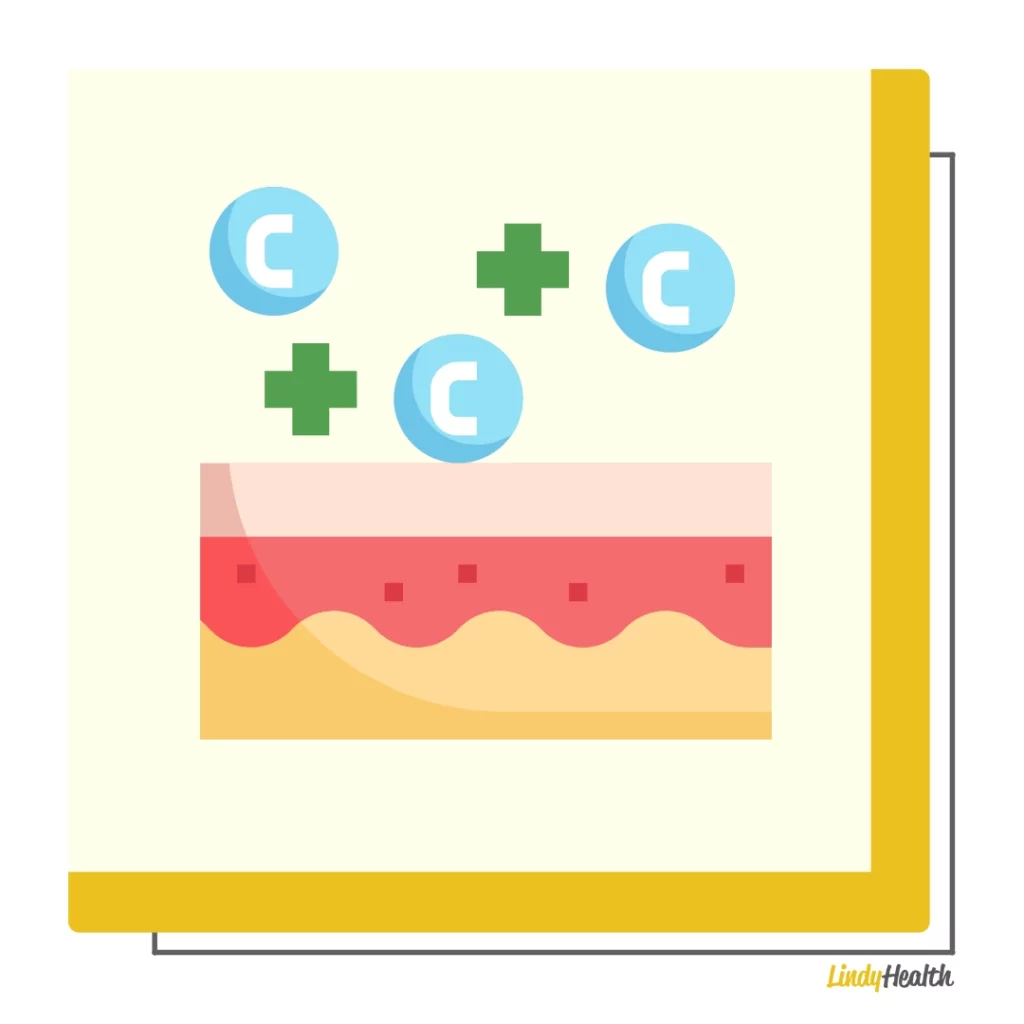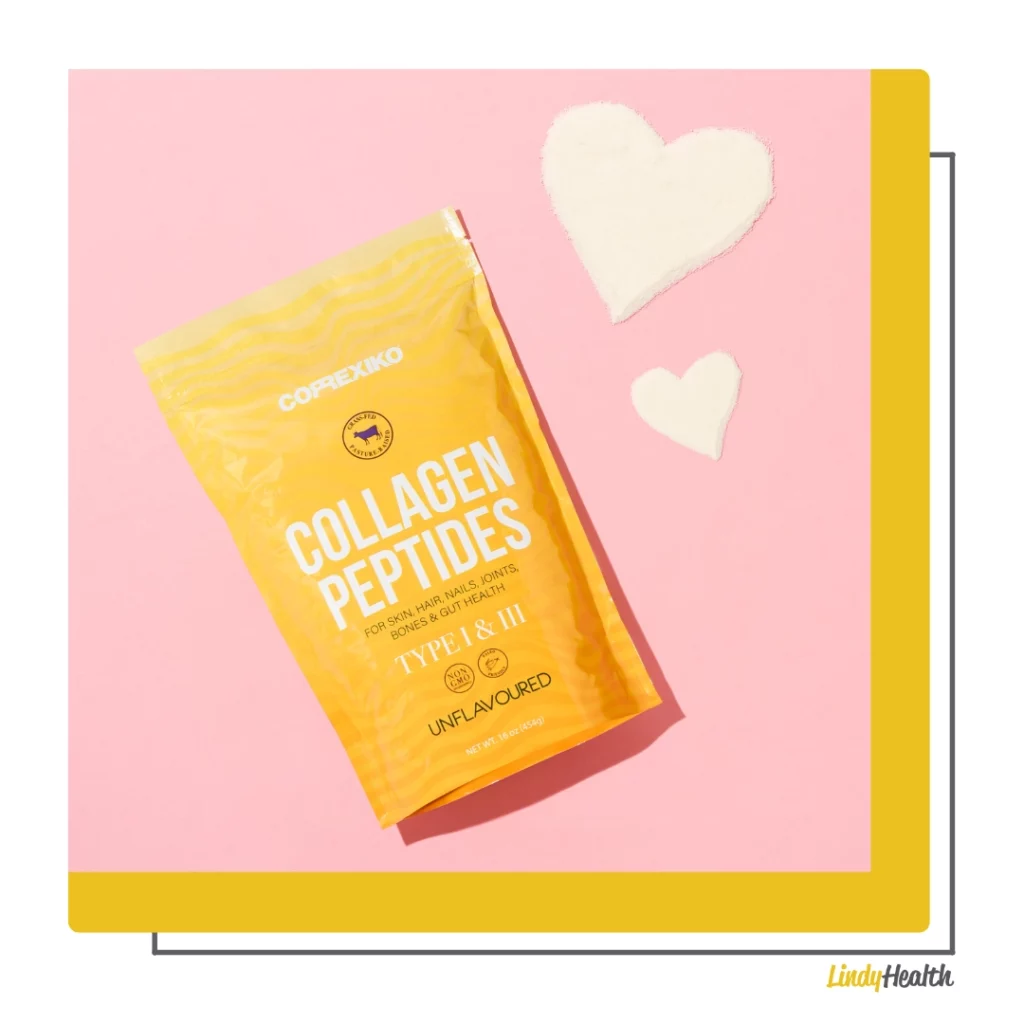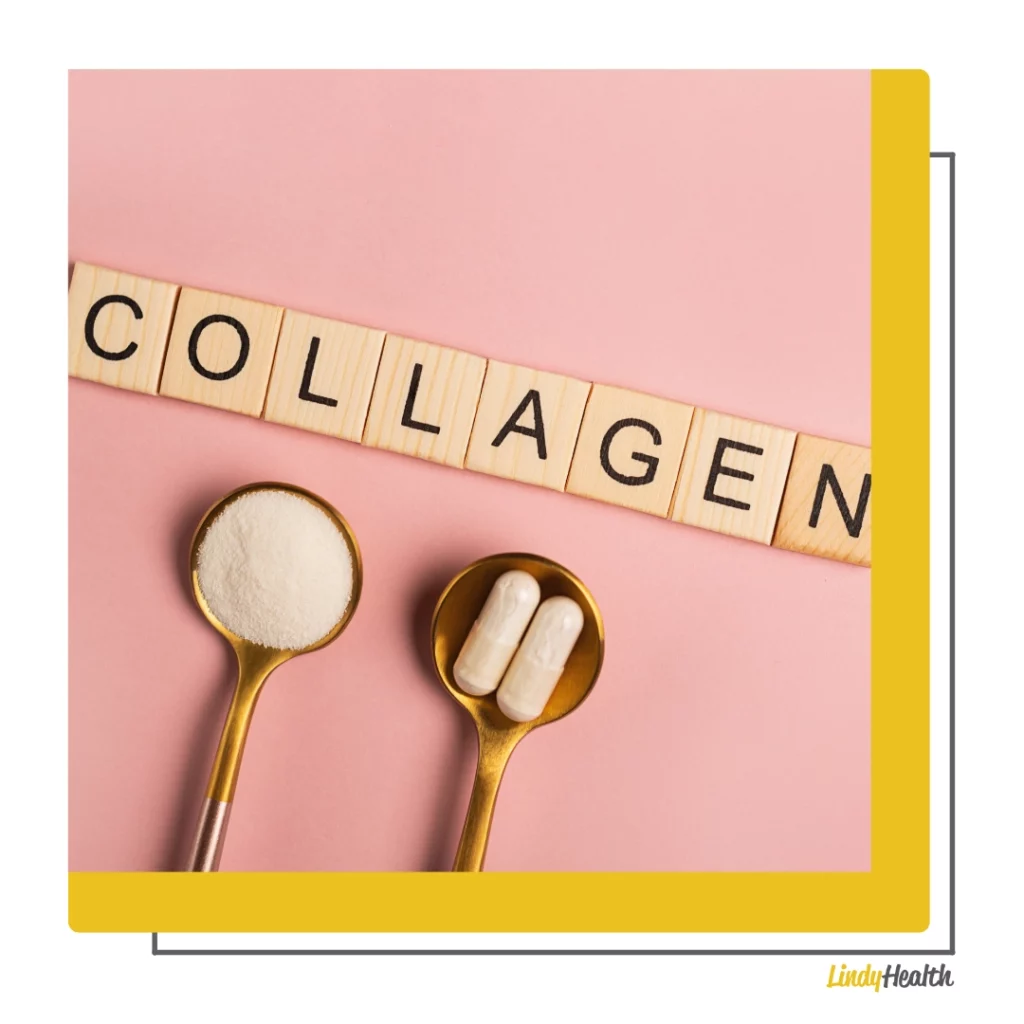The debate online about liquid collagen vs collagen peptides is heating up in 2022.
Collagen, collagen peptides, and liquid collagen. These are all likely to be terms well established in the mind of every health-conscious blogger or advocate.

But which form of collagen is truly the best in the face-off between Liquid Collagen vs Collagen Peptides?
What do these terms actually mean, and is collagen truly all it has been cracked up to be in the blogosphere?
Even Jennifer Aniston purports using collagen on a daily basis for the health benefits – right?
What is Collagen?
Collagen and collagen peptides are often used interchangeably but may not necessarily mean the same thing. Liquid collagen, on the other hand, is often in the processed form of collagen peptides – just in a liquid format.
Read on as we explore the differences between the various Types (I, II, III) of collagen, the different forms (liquid collagen, collagen peptides, and gelatin), and what they actually offer consumers in terms of health benefits.

First, what exactly is collagen? ‘Collagen’ in the broadest sense of the term is the long-chain amino acids that are found in our tissues, skin, joints, and bones. They are the most abundant protein in the body.
At the same time, they cannot be obtained directly through diet unless supplemented. Instead, our body naturally produces collagen out of pre-cursors: these are things like vitamin C and amino acids, which can increase collagen production in the body.
However, as we age, the production naturally declines, and this is why we see the ‘results’ of aging both internally and physically. These include fine lines, wrinkles, joint pain and inflammation, and arthritis.
In traditional, unhydrolyzed full-length form, collagen is not effective as a
This needs to be further broken down and processed, so we can utilize it optimally in the forms of supplements – this is where we hear the terms “collagen peptides” and “hydrolyzed collagen” from, as these are processed forms of collagen that are easily absorbed and utilized by the body.
What about ‘Gelatin’ and ‘Bone Broth?’
What about gelatin? Gelatin is a form of collagen that has undergone ‘partial hydrolysis,’ which gives it that ‘gel-like consistency. These partially hydrolyzed chains in gelatin cause the gelling due to the water content – this is why it is often used as a thickening agent for soups and other recipes.

‘Bone Broth’ is similar to ‘gelatin’ in this sense and is essentially the same thing. Bone broth, like gelatin, is made by slowly cooking bones and connective tissue in water – and the gelatin dissolves into the bone broth.
The actual ‘benefits’ of bone broth, which are compared to that of collagen, are actually from the gelatin content of the bone broth. Bone broth does not have the same beneficial properties that collagen peptides do.
The Different Types of Collagens – Type I, II, & III
What about “Types” of collagens? Well, there exist various different Types – I, II, & III being the most common.
Different types are found in different parts of the body, and serve different functions when supplemented. “Marine” collagen – sourced from fish scales, contains Type I predominantly, for skin, hair and nail health, with Type II to a lesser extent.
This is the type found in joints and ligaments and is particularly useful for those with osteoarthritis.

Type III will have this benefit, as well as impacting digestive and gut health by restoring integrity to the junctions of the gut. This is from the high amino acid content of the collagen peptides, particularly the glutamine and glycine content.
Liquid Collagen vs. Collagen Peptides: Which One is Better?
So, clearly, collagen peptides are what we want to be supplementing with. But what exactly are ‘peptides’ and how is this collagen produced?
Collagen peptides, also known as “hydrolyzed collagen” or “collagen hydrolysate” is a form of collagen that has simply been broken down first so it is useable by our bodies.
The process of hydrolysis (where water molecules disrupt the bonds in an enzymatic process) breaks down the collagen into smaller chains of protein – these are what we know as “collagen peptides.” Almost all commercially available collagen will thus be hydrolyzed to be processed and for consumers to be able to dissolve it in water.
At the same time, any “liquid collagen” you purchased is already hydrolyzed by nature of it being dissolved in water in a pre-manufactured product.

The questions are then – are collagen peptides actually useful and do they have health benefits?
The literature and studies clearly tell us that yes, collagen peptides, when supplemented, do offer and confer numerous health benefits when used for a prolonged period of time.
Collagen supplementation is noted to help improve skin elasticity, hydration of the skin, reduce wrinkles and fine lines, help with joint pain and inflammation from arthritis, improve bone loss in those with osteoporosis, and improve the health of nails, hair, and teeth.
FAQ:
Is Liquid Collagen Better than Powdered Collagen?
Liquid collagen is not “better” per say, when compared to powdered collagen. It may be more convenient – making it easier for consumers to stick to using it on a daily basis.
Liquid forms are often found to contain less collagen per serving, as well as other additives when compared to an unflavored powder. However, they are found to be absorbed into the bloodstream more effectively, as demonstrated here. Generally, the recommendation would still be to opt for a high-quality, additive-free, unflavored Collagen Peptide powder.
Is it Better to Take Collagen or Collagen Peptides?
Collagen peptides are generally believed to be more bioavailable – meaning you’ll get much more out of it, in terms of results. This is because they are comprised of shorter chains of amino acids when compared to gelatin, collagen, and bone broth.
Collagen peptides may be labelled under “Hydrolyzed collagen powder,” which is a different designation for the exact same end product. Collagen is further broken down into these collagen peptides through the form of hydrolysis – and as such, are often referred to as “Hydrolyzed Collagen” or “Hydrolyzed Collagen Peptides.”
Is Liquid Collagen the Same as Collagen Peptides?
Liquid collagen may not entirely be the same as Liquid Collagen vs Collagen Peptides – but they are often derived from collagen that has been hydrolyzed the same as most collagen peptide powders. Just ensure you check the source of the liquid collagen – marine or bovine, to better understand which ‘Type’ (I, II, III) of collagen you’re consuming.
Which Form of Collagen is Most Effective?
Collagen Peptides will be the most effectively absorbed form of collagen. Which ‘Type’ of collagen you’ll want to take may depend on your individual needs and personal preferences. Types I and III are the most abundant in the body and are sourced from bovine origin. These types are found in your tissues, and skin, and can help with everything from gut healing, to wrinkles.
Type II is less abundant but makes up the majority of the protein surrounding your connective tissue and joints – making Type II the one to pick for those with joint pain or arthritis. Type II is found in lower quantities in ‘Marine Collagen,’ and in abundance in ‘Chicken Bone Broth,’ while Types I & III are found in ‘Bovine Collagen’ and Bone Broths.
Are Collagen Peptides a Waste of Money?
Collagen peptides are definitely not a waste of money – of course, there’s no telling how effective collagen peptides will be for your specific, intended use. That being said, the research does demonstrate that collagen supplementation can effectively help with joint pain, inflammation, bone loss prevention, wrinkle + fine line reduction, healthier nails, hair and teeth, and skin elasticity.
If these are conditions or concerns you have, then looking into supplementation with Collagen Peptides is worth considering – and well worth the money as in investment in your health.
What Collagen Does Jennifer Aniston Use?
Jennifer Aniston swears by ‘Vital Proteins’ Collagen Peptides’ as her go to collagen choice, which she incorporates into her ‘daily routine.’ Jennifer appears to opt for their powdered, Unflavored Collagen Peptides – added to her “morning cup of coffee or smoothie.”
Always Choose High-Quality, Marine or Bovine Collagen Peptides
So really, liquid collagen and collagen peptides are one in the same.

The only key difference is that many liquid collagen products may contain less collagen per gram – so you get much more bang for your buck out of opting for a collagen peptide powder you can mix into liquids yourself, creating a measured dose daily.
As well, many ‘liquid’ collagens can contain additives or preservatives to extend the life of the product, whereas an unflavored collagen peptide product will not require this.
While they’re both the same ‘thing,’ a collagen peptide powder will offer you the most benefit by offering you the highest quality and amount of collagen per serving.
Where do you stand in the Liquid Collagen vs Collagen Peptides debate?
Let us know in the comments below!
- Bakhar Nabieva [Fitness Model] - September 22, 2022
- Onnit Shroom Tech Review - September 3, 2022
- Liquid Collagen vs Collagen Peptides - August 18, 2022








